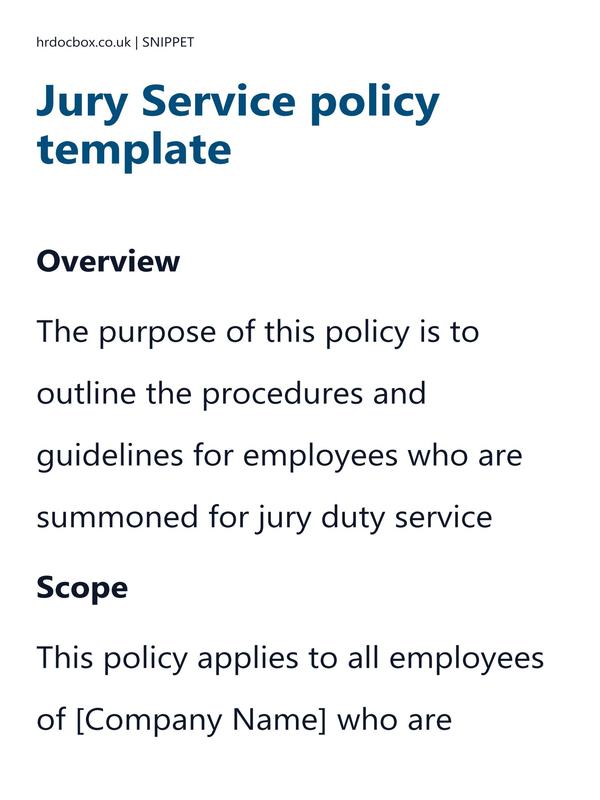Jury Service policy template


Our Jury Service Policy Template ensures clarity and fairness in managing employee obligations and rights during jury service.
- Includes 12 months' access to the Jury Service policy template, with all updates provided free of charge and notified to you.
- UK-specific accuracy.
- 269 words over 2 pages.
- Last updated 01/10/2025.
- Format: Word / plain text / email.
- Delivery: Instant download after purchase (no physical item).
- Access: Download link shown here after checkout.
- This Jury Service policy template will SAVE you up to 1 hour drafting & research, save you money, and reduce your risk.
Jury Service policy
1 Overview
1.1 The purpose of this policy is to outline the procedures and guidelines for employees who are summoned for jury duty service
2 Scope
2.1 This policy applies to all employees of [Company Name] who are summoned for jury service.
3 General principles
-
Employees summoned for jury servicemust notify their immediate supervisor as soon as they receive the summons.
-
Upon receiving the notification, the employee must provide a copy of the summons to the HR department for documentation purposes.
-
[Company
This is a 30% preview of the Jury Service policy template. For instant full access, purchase this item or a parent bundle.
Jury Service policy template purpose
The Jury Service Policy outlines the procedures and responsibilities for employees required to serve on a jury. It provides clarity on the rights and obligations of both the employer and the employee during this period, ensuring compliance with legal requirements and maintaining a fair and supportive work environment.
This policy helps employees understand their entitlements, such as paid time off for jury duty, while also outlining the process for notifying the employer and providing necessary documentation.
By establishing clear guidelines, the policy facilitates smooth communication and coordination between the employee, employer, and the court system, ultimately contributing to the effective management of jury service within the workplace.
Practical application of a Jury Service policy template
- Issue the Jury Service policy template during onboarding / after changes / planned refresher.
- Send it to appropriate internal recipients such as employees, workers, contractors etc. and request confirmation that is has been read and understood.
Compliance
Compliance
This Jury Service policy template incorporates relevant UK laws and HR standards, including those listed below:
-
Legal Obligation: Employers must allow employees time off to attend jury service when summoned as it is a legal obligation for individuals to serve on a jury when called upon.
-
Employment Rights: Employees have the statutory right to take time off work for jury service without facing dismissal, disciplinary action, or detrimental treatment from their employer.
-
Statutory Protection: The Employment Rights Act 1996 provides statutory protection to employees against unfair dismissal or detriment for attending jury service.
-
Communication: Employers should maintain open communication with employees who are summoned for jury service to ensure smooth coordination of work arrangements during their absence.
-
Replacement or Cover: Employers may need to make temporary arrangements to cover the workload of employees serving on jury duty, such as assigning tasks to other employees or hiring temporary staff.
-
Penalties for Non-Compliance: Failure to comply with legal obligations regarding jury service can result in penalties for employers, including fines and legal action for unfair treatment of employees.
-
Public Interest: Supporting employees in fulfilling their civic duty by serving on a jury contributes to upholding the principles of justice and the rule of law, which are in the public interest.
Frequently Asked Questions about a Jury Service policy template
Frequently Asked Questions about a Jury Service policy template
-
Can I use the Jury Service policy template in my small business?
Yes. The Jury Service policy template is designed to be flexible and suitable for organisations of all sizes, including small businesses and charities. It follows UK employment law best practice, so even if you don't have an in-house HR team, you can confidently apply it.
-
Is the Jury Service policy template compliant with 2026 UK employment law?
Absolutely. Like the Jury Service policy template, all of our templates are drafted with the latest ACAS guidance and UK employment legislation in mind. We review and update them regularly, so you can be confident they remain compliant.
-
Can I customise the Jury Service policy template for my organisation?
Yes, we highlight the areas of the Jury Service policy template that you need to update with your own details, and where you need to make decisions to suit your situation. This saves you time and ensures that you meet best practice.
-
Do I get instant access to the Jury Service policy template?
Yes. Once purchased, you'll be able to download the Jury Service policy template instantly. Templates are provided in editable Word or Excel format so you can customise them easily, and in PDF format for easy sharing.
-
What if I need more help, not just a Jury Service policy template?
If you're looking for broader support, we also offer toolkits and library bundles that include the Jury Service policy template, along with other HR templates and policies for fully managing your situation. These may be more cost-effective if you need deeper advice.
-
Why should I use this Jury Service policy template, and not AI to generate it?
The risk of using a free AI-generated template 'without review' includes your legal exposure, missing context, and no awareness of the wider process, whereas purchasing the Jury Service policy template from us mitigates that risk.
